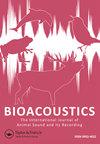海豚在种间群体环境中调节哨声吗?
IF 2.1
4区 生物学
Q2 ZOOLOGY
Bioacoustics-The International Journal of Animal Sound and Its Recording
Pub Date : 2022-01-04
DOI:10.1080/09524622.2021.2023047
引用次数: 3
摘要
鲸目动物高度依赖于声音信号,如口哨,进行社交交流。混合物种协会(MSAs),不同物种之间的临时或长期相遇,可能对所涉及物种的声学动力学起着重要作用。由于哨子的交流功能,我们使用这些声音来研究截断Tursiops truncatus在不同群体环境中的声学关系:在与其他两种飞燕属物种的MSAs中以及在单一物种群体中。通过拖曳式水听器阵列,在南大西洋西部收集了截断T.truncatus单个物种群以及与Globicephala melas和Grampus griseus相关的声学记录。共分析了1267个哨声,提取了声学参数。为了验证在这种情况下产生的口哨声之间的差异,实现了支持向量机和随机森林分析。两项分析都显示,哨子与单一物种、MSA以及两种MSA之间有明显的分离。结果表明,种间关联可能会影响哨子结构,并表明截断T.truncatus哨子在种间相互作用过程中可以被修饰。这些发现有助于阐明行为可塑性和种间关联的可能因素,并理解海豚的声学交流。本文章由计算机程序翻译,如有差异,请以英文原文为准。
Are dolphins modulating whistles in interspecific group contexts?
ABSTRACT Cetaceans depend highly on acoustic signals, such as whistles, for social communication. Mixed-species associations (MSAs), temporary or long-term encounters between different species, may play an important role on the acoustic dynamics of the species involved. Because of whistles’ communication function, we used these sounds to investigate the acoustic relationships of Tursiops truncatus when involved in different group contexts: in MSAs with two other delphinid species and in single species group. Acoustic recordings of T. truncatus single species groups and in associations with Globicephala melas and Grampus griseus were collected in the Western South Atlantic Ocean through a towed array of hydrophones. A total of 1267 whistles were analysed and acoustical parameters were extracted. To verify the differences among whistles produced in such contexts a support vector machine and random forest analysis were implemented. Both analyses revealed a clear separation of whistles from the single species versus the MSA as well as between both MSAs. The results indicate that interspecific associations may influence the whistle structure and suggests that T. truncatus whistles can be modified during interspecific interactions. These findings are useful to elucidate the possible factors underlying behavioural plasticity and interspecific associations and to understand dolphins’ acoustic communication.
求助全文
通过发布文献求助,成功后即可免费获取论文全文。
去求助
来源期刊
CiteScore
4.50
自引率
0.00%
发文量
25
审稿时长
>12 weeks
期刊介绍:
Bioacoustics primarily publishes high-quality original research papers and reviews on sound communication in birds, mammals, amphibians, reptiles, fish, insects and other invertebrates, including the following topics :
-Communication and related behaviour-
Sound production-
Hearing-
Ontogeny and learning-
Bioacoustics in taxonomy and systematics-
Impacts of noise-
Bioacoustics in environmental monitoring-
Identification techniques and applications-
Recording and analysis-
Equipment and techniques-
Ultrasound and infrasound-
Underwater sound-
Bioacoustical sound structures, patterns, variation and repertoires

 求助内容:
求助内容: 应助结果提醒方式:
应助结果提醒方式:


